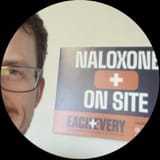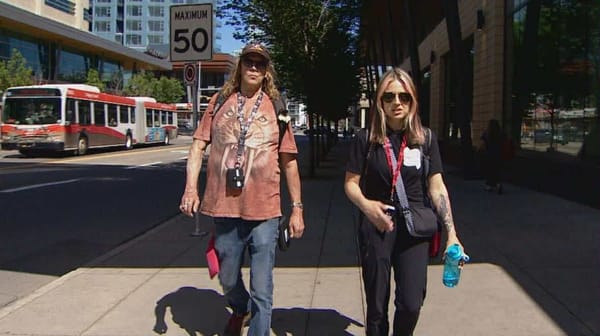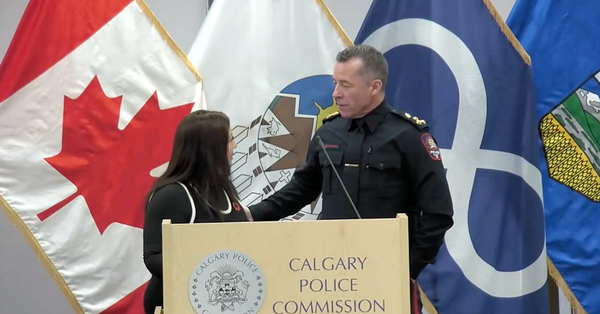Part 3 - Meet the physicians stonewalling safe supply
The unregulated drug poisoning crisis has proven to be fertile ground for disaster capitalism. Here, we'll examine the soils in Alberta that help it thrive.
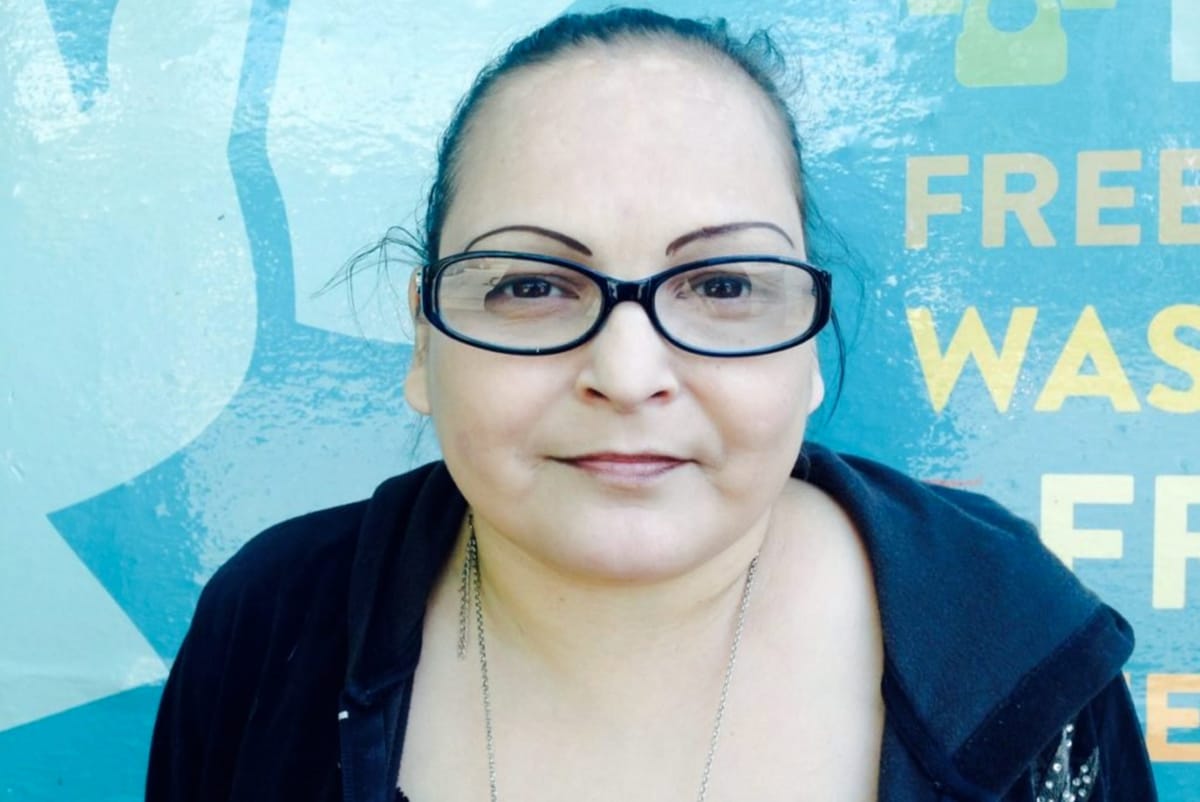
Part 1 identified the commercial interests of a cohort of addiction medicine doctors in Ontario, Alberta and BC who co-authored an open letter advocating against safe opioid supply to federal Minister of Mental Health & Addiction Ya’ara Saks. The doctors’ various commercial interests, including methadone clinics, “recovery-oriented systems of care” consultancies, a recovery coaching company and back-to-work urine monitoring companies, went largely unmentioned in the open letter.
Part 2 identified some commercial interests missed in Part 1 and used the Toronto Star’s 2019 publication of a database of physician billing to show that the majority of the open letter signatories based in Ontario billed at or near the top 5% of 14,000 comparable physicians in 2017-18. Both parts raise serious questions about the motivations of the physicians signing the open letter.
Here in Part 3, we’ll examine the ideological alignment between many of these physicians and Alberta’s governing United Conservative Party, focusing on two public forums where these two groups have gathered: the Alberta Government’s Select Special Committee to Examine Safe Supply (hereby referred to as the safe supply committee) and a series of addiction and recovery conferences.
The Alberta Safe Supply Committee
In January 2022, Alberta’s UCP government announced it would undertake a formal review of safe supply. A panel of American and Canadian prohibitionist-minded advocates were invited to shore up its ideological message: safe supply was bound to be diverted into our communities where it would poison our children and render addiction recovery impossible for those in the process of trying.
After seeing the list of invited presenters, Moms Stop the Harm and EACH+EVERY (a national coalition of businesses I help lead) recused ourselves from presenting to the committee, citing insurmountable bias. We dubbed it another consent-manufacturing exercise similar to the 2019 Supervised Consumption Site review.
The open letter signed by 17 addiction physicians, which triggered the series you are now reading, included 3 of the 23 presenters to the Alberta safe supply committee: Dr. Jennifer Melamed and Dr. Maire Durnin (co-owners of Precision Medical Monitoring in BC), and Dr. Launette Rieb. Dr. Rob Tanguay (who employs letter signatory Dr. Annabel Mead at The Newly Institute) also presented. Written submissions were prepared by letter signatory Dr. Mel Kahan and Globe op-ed regular Dr. Vincent Lam (Dr. Lam was discussed in Part 2).
Dr. Maire Durnin
Dr. Durnin provided what could generously be called a conflict-of-interest statement at the start of her presentation, citing that she works at “a private recovery centre, the Orchard on Bowen Island [owner undisclosed]. I also work in occupational health settings, where we have an extra tool to help people get better when they want to keep their jobs; it’s an incentive. Also, on top of that, I serve on the board of VisionQuest…”. She did not mention her ownership of Precision Medical Monitoring.
But, wait — “get better when they want to keep their jobs; it’s an incentive”? This is an incredible explanation of the way that the urine monitoring industry profits from excluding people who use drugs from economic participation.
Halfway through her presentation, in a spectacular feat of mental mudwrestling, Dr. Durnin flipped the Iron Law of Prohibition on its head. Rather than enforcement driving increasingly potent drugs (which are better at evading enforcement), she claimed drug distributors are in a mindless potency arms race against the prescribed market:
“This is how people think. There will never be a more potent opiate that we can make that is greater than what the dealers can supply. It’s like a game of better than, better than, better than. They will always top it.”
It’s remarkable that Dr. Durnin could reduce her own clients to robotic consumers of supplier whims. She went on to describe “why safe supply can never be enough for these people,” managing to dehumanize modern drug users while simultaneously tossing aside thousands of years of legal opioid use with current safe supply research that would tell her very much the opposite story, if she’d listen.
However, she is correct that private medical prescribers and illegal suppliers are in competition.
Closing her presentation, Dr. Durnin referred to “The clinic that I work in, that I started with Dr. Melamed, who you’re also going to hear from…,” but did not name Precision. Was this an evasion tactic, perhaps related to the negative press these doctors and Precision received several months before the safe supply committee?
In her Q&A, Dr. Durnin mentioned in passing that she works with Dr. Melamed in Surrey-based Alliance Clinic (unrelated to Alliance Medical Monitoring previously owned by Dr. Farnan, discussed in Part 1). The Alliance Clinic site shows an affiliation I had previously missed: its five physician staff include letter signatories Dr. Alan Brookstone, Dr. E. Maire Durnin-Goodman and Dr. Jenny Melamed.
We’ll close Dr. Durnin’s presentation with a revealing quote. She was describing the patients she and Dr. Melamed treat in their methadone / Suboxone-prescribing practice:
“With safe supply… Many of our patients scattered. Many did not come back. A few did. They are basically either lost to follow-up, you know, and we’re not getting the new patients to replace them because now on the street you can get anything, any time, anywhere.”
They were losing patients. If you read Part 2, this also implies they were losing money.
Dr. Jennifer Melamed
Dr. Melamed, coincidentally, was next in the lineup of 23 presenters. Did she cite any conflicts of interest? No, but she did mention that at Alliance Clinic they are “prescribing methadone and Suboxone”.
Given that both doctors have holdings in private prescribing, private treatment, and private urine monitoring, it’s notable they both passed on the opportunity to mention these while advocating against safe supply to an elected government.
However. Dr. Melamed did mention her participation on BC’s 2009-2014 Methadone Maintenance Committee, which appears to have steered the 2014 switch from generic methadone to a patented oral formula, Methadose. According to the BC Association of People On Methadone (BCAPOM), “People absolutely died as a result of this change.” You can hear about their struggle on Crackdown’s second episode, Change Intolerance.
A 2020 review of studies analyzing this pattern agrees, concluding that “the change in methadone formulation led to destabilization of patients and a significant rise in opioid-related morbidity and mortality.”
I couldn’t identify the other physicians on the committee, whose tracks have been covered by broken internet links. A class-action lawsuit launched against the province in 2020 by lead plaintiff Laura Shaver could eventually set the record straight.
A 2010 Qualitative Systems Review of the changes being discussed in methadone maintenance treatment (MMT) for BC was conducted through the University of Victoria. The authors made an interesting note when discussing common criticisms of private methadone clinics by physicians, pharmacists and people who use them:
“The reported financial links between some private methadone clinics, pharmacies and recovery houses that may involve directing clients to use a particular service in return for a financial kick-back to the referring service”
Dr. Melamed’s presentation was so full of stigmatizing language around drug use, including her repetition of Michael Shellenberger’s line that people on safe supply are “palliative,” it’s hard to take the remainder seriously. Understanding her role in prescribing policy changes, alongside Dr. Durnin’s concerns that their private interests could be placed at risk by safe supply, is helpful context.
Dr. Launette Rieb
It’s likewise not worth repeating the anecdotes and junk science Dr. Rieb cites throughout her presentation, but one line stood out in particular as she described people who access safe supply:
“Just like with cancer, there are people who want homeopathic remedies instead of taking surgery, radiation, and chemotherapy, and that is their right, but that is not where we put the public health care dollar.”
Like her esteemed colleagues, Dr. Rieb seemed compelled at this moment in February 2022 to ignore both the emerging evidence on safe supply as treatment in Canada and the history of safe supply prescribing in Europe.
Access to regulated drugs isn’t hokey treatment: it really works for people as it did a hundred years ago, pre-prohibition. But our governments have ignored it, because it doesn’t work for the settler colonial system we are working to uphold through drug criminalization. Meanwhile, Dr. Rieb ignored how residential treatment lacks evidence for halting opioid use — asserting that “helping employers get workers back into treatment” will somehow “save lives.”
She told the committee, “I think this is a bit of a tough topic and very emotional, but certainly I think people are going to die on either side of this issue.” Here, she seemed to be reinforcing her view that people who use opioids are “palliative” and will die regardless of whether they access safe supply or not. The data from these programs show near-universal survival among people enrolled in them.
Dr. Rob Tanguay
Dr. Tanguay is no doubt familiar with the MLAs he presented to, after all the time he’s spent with them at government announcements. Among these was the opening of psychedelics therapy in Alberta in October 2022. Through this, his company the Newly Institute gained first access to clients for treatment. These clients include various police forces and associations including Calgary Police, Workers Compensation Board-Alberta, and several insurance companies. Six months after the psychedelics announcement, he was appointed to Calgary Police Commission by the Alberta Government through new pre-election legislation.
In his presentation, he stated that “we know that when we look at the prescription of opioids and deaths, the correlation coefficient is .99; 1 is absolutely if we do A, we get B. If we prescribe more, we see more deaths.”
Here, Dr. Tanguay appears to ignore that Dr. Deena Hinshaw’s data presented to the same safe supply committee shows the opposite of what he is suggesting: less prescribing in fact correlated with more death.
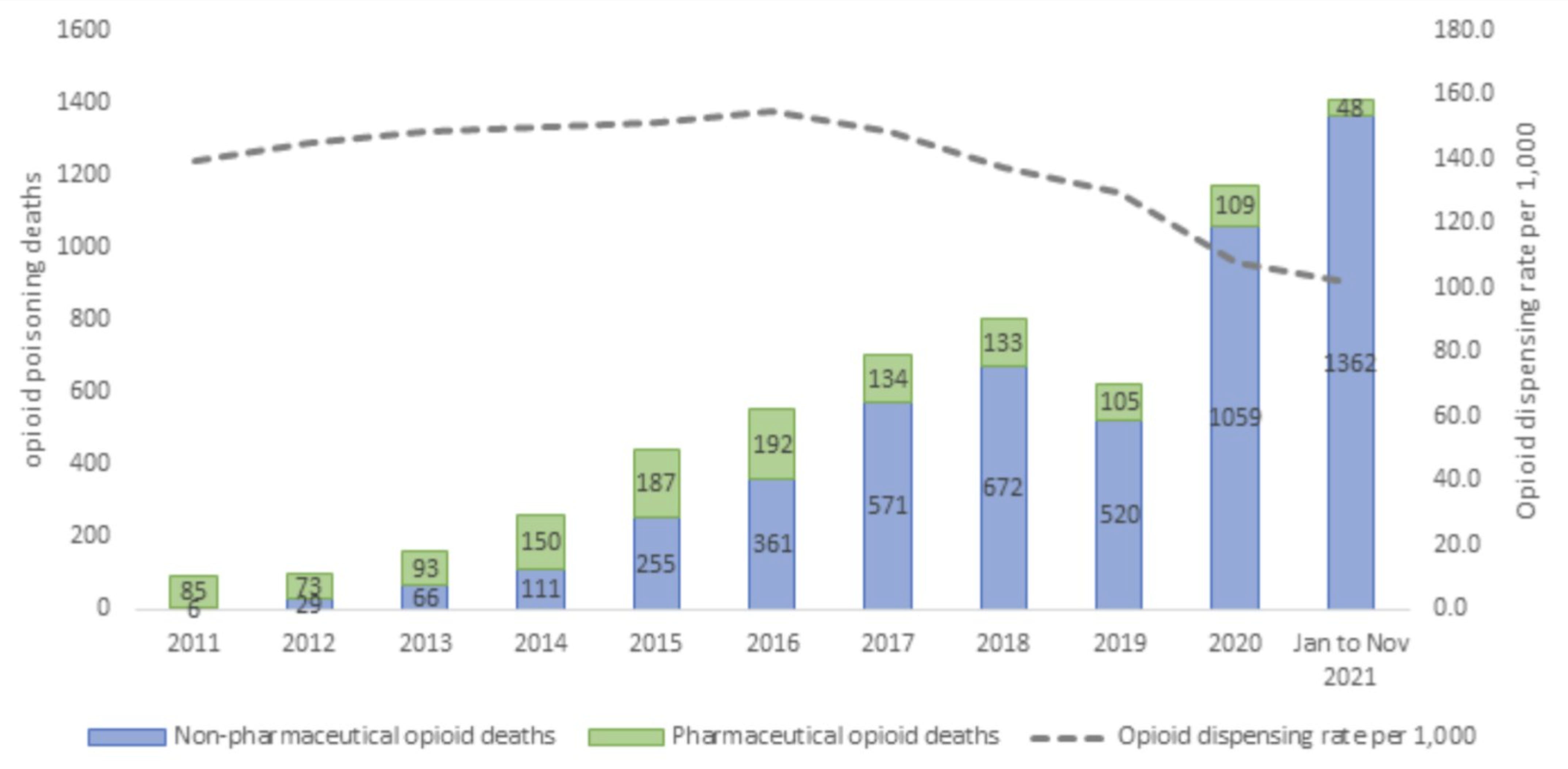
But perhaps the most revealing is the way Dr. Tanguay opens the door to GOP-style “good old times” narrative on opioid use in society:
“When we look at opioid prescribing and consumption, the United States: number one. And right behind the United States is our own country, in Canada…[In comparison] you see Israel, France – you know, not Third World countries but countries that were well developed with good medical systems – not prescribing and consuming.”
But, wait — many differences aside, is there some parallel between US/Canada and Israel that Dr. Tanguay could have mentioned here…something about settler colonialism and establishment of apartheid… Perhaps he could have interrogated whether opioid use has exploded among Palestinians? It has.
[Note: after publishing this story, I indulged a creeping suspicion that Dr. Tanguay’s statement needed to be fact-checked. It turns out, in 2020 Israel became the world’s top consumer of opioids. Perhaps there’s something about settler colonial states that feeds greater need for painkillers. In any case, Tanguay was incorrect when he made this statement to the Alberta Government in 2022.]
In stripping context about why the US and Canada gobble up opioids, Dr. Tanguay can reinforce a simplistic narrative about evil opioid manufacturers (many of which he’s taken money from — wait for it) while implying that people who use opioids are a barrier to reaching a fabled drug-free society. Whether or not cutting them off their regulated drug access puts them at risk of death is of secondary or no concern. And by ignoring the social context, we can simply transplant one country’s policies and Voila! Mazeltov! — less drug use. It’s colonial thinking applied to drug policy. Except it may also carry a profit motive.
Turns out, Dr. Tanguay’s private returns have been generated beyond psychedelic trauma therapy.
The conferences. So. Many. Conferences.
Addiction-centred conferences are so frequent and so uniform, the only way to keep their organizers and sponsors straight was to build a table (I’ve limited entries to the people and organizations listed in this series). Before you dive in, a glossary of the ways these organizations and people are involved with the Alberta Government:
- Cedars at Cobble Hill (BC): Marshall Smith (current chief of staff to Premier Danielle Smith), was director of corporate development mid-2010s
- Fresh Start Recovery (AB): Won the contract for the Lethbridge Therapeutic Community
- Edgewood Health Network (ON/AB): Won the contract for the Red Deer Therapeutic Community; employs Stacey Ferland since she resigned from Calgary Police amid a trauma counselling scandal in January 2023
- Last Door Recovery (BC): Licenses My Recovery Plan to the Alberta Government through $1.76 million sole-source contracts; organizes Recovery Capital Conferences; recruits clients to New Westminster facility from Calgary office; early member of North America Recovers; employs Giuseppe Ganci and Jessica Cooksey; co-founded by Louise Cooksey and David Pavlus
- Our Collective Journey (AB): Founding ED was Rick Armstrong (since replaced); early member of North America Recovers
- Newly Institute (AB): Co-founded by Dr. Rob Tanguay; clients include Calgary Police despite Dr. Tanguay being appointed to Calgary Police Commission; medical advisory board includes open letter signatory Dr. Annabel Mead
- Oxford House (AB): Executive Director is Earl Thiessen; controls nearly one-quarter of transitional (long-term) residential treatment beds in Alberta
- Terminator Foundation (AB): Activity-Based Recovery Therapy; Dr. Rob Tanguay serves on advisory council
- Homewood Health (national): Employs open letter signatory Dr. Harry Vedelago
- CACCF: Canadian Addiction Counsellors Certification Foundation; Marshall Smith was president prior to joining Alberta Government; employs Jessica Cooksey; detailed in Marshall Smith’s human centipede.
This table shows a set of conferences that feature a lot of the same speakers and sponsors. Speaker names in bold are physicians who signed the open letter advocating against safe supply in Canada, while Exhibitor/Sponsor names in bold hold contracts with the Alberta Government. I haven’t bothered to go into CSAM or other more nationally recognized events, but these are worth a look as well.
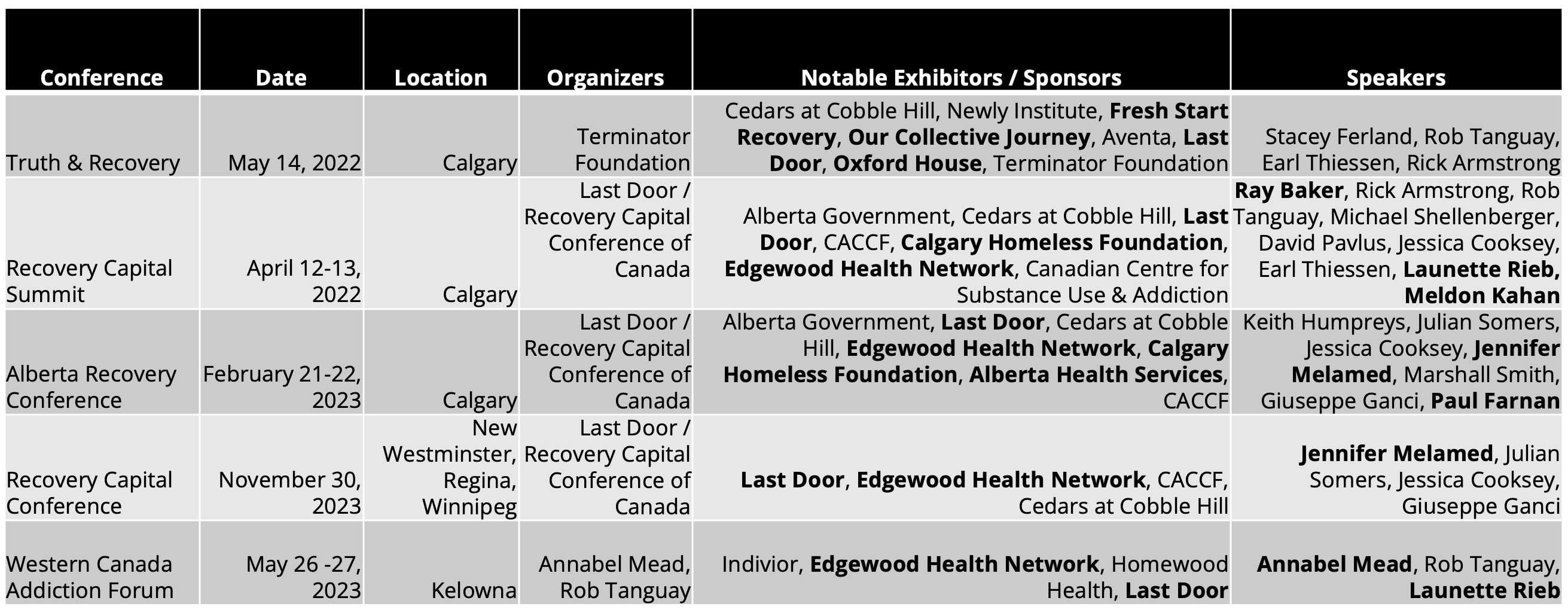
Dr. Tanguay owns or previously owned a conference production company called RLT Conferences. It’s unclear what role, if any, RLT Conferences played in the above events. However, the table below shows disclosures from a 2019 Opioid Dependency Program training course. On top is Dr. Esther Tailfeathers with a typical number of conflicts to declare (zero). Below, Dr. Tanguay declares that in addition to the speaking money he has taken from pharmaceutical companies, RLT Conferences accepted sponsorships from an even larger number including Purdue. In his 2022 safe supply committee presentation, he demonized Purdue for creating opioid demand.
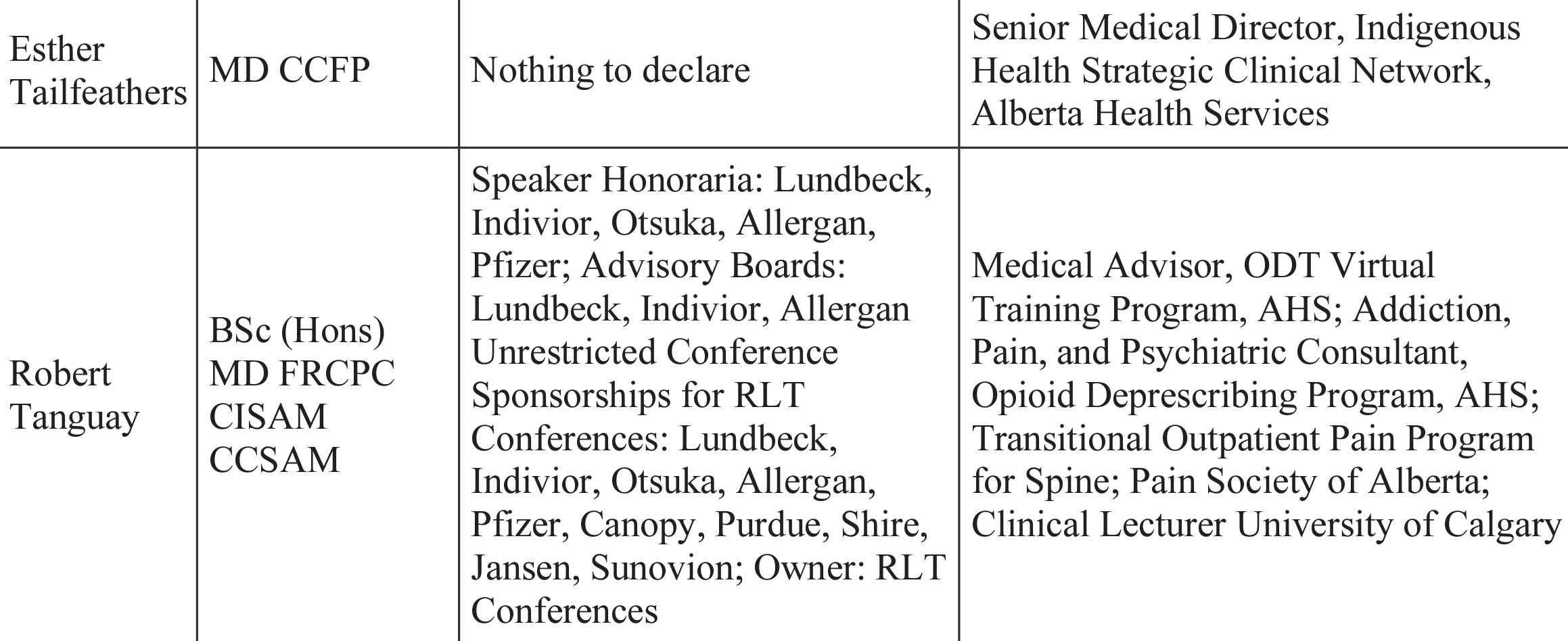
What kind of money are we talking about here? I was told by an Alberta physician the following: “advisory board honorarium for one night is like $750-1000. Speaking is at least double that.” So Dr. Tanguay — at that early stage in his career, just two years out of his General Psychiatry residency — could have racked up $10,000 in speaking fees, $3,000 in advisory board honoraria, and likely tens of thousands of dollars in conference sponsorships to his private company (the 2023 Recovery Capital Conference sponsorship package sets Gold sponsor at $20,000).
Dr. Tanguay’s relationship with Indivior, Jansen and Otsuka has persisted to this day: he co-chairs Western Canada Addiction Forum with Dr. Mead, and all three companies were exhibitors at this year’s conference.
It’s fascinating and horrifying to consider the power that is being shored up within these publicly funded organizing spaces, from Recovery Capital Conferences to strictly medical conferences that bring in addiction physicians from all over, packing all of their commercial baggage.
If we want to have serious discussions about safe supply, or truly any drug policy measures in this country, it needs to start with transparency. Journalists who are seeking commentary from physicians, please look into your sources: what do they own and who cuts their paycheque? The question is as simple as “Are you aware of any financial interests you hold that could interfere with your objectivity on this subject?”
With this measure made commonplace, we could expect to hear from a different group of physicians empowered to weigh in on drug policy.
Did you enjoy this post? Please share it on social media or send it to a friend!
Drug Data Decoded provides analysis on topics concerning the war on drugs using news sources, publicly available data sets and freedom of information submissions, from which the author draws reasonable opinions. The author is not a journalist.

